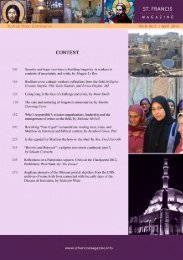download the pdf - St.Francis Magazine
download the pdf - St.Francis Magazine
download the pdf - St.Francis Magazine
You also want an ePaper? Increase the reach of your titles
YUMPU automatically turns print PDFs into web optimized ePapers that Google loves.
<strong>St</strong> <strong>Francis</strong> <strong>Magazine</strong> Vol 8, No 4 | August 2012<br />
sciousness, predisposing him to conflict even though he believes in Arab<br />
unity and bro<strong>the</strong>rhood (Patai 2007, 239).<br />
Donna Hicks explains one of <strong>the</strong> dimensions to protracted ethnic<br />
conflicts in quoting Herbert Kelman:<br />
Threats to identity create a zero-sum view of <strong>the</strong> conflict, where one’s<br />
very existence seems inextricably linked to <strong>the</strong> negation of <strong>the</strong> o<strong>the</strong>r.<br />
An acknowledgment of <strong>the</strong> identity of <strong>the</strong> o<strong>the</strong>r is perceived as an act of<br />
self-destruction, as recognizing <strong>the</strong> experiences of <strong>the</strong> o<strong>the</strong>r fundamentally<br />
brings into question one’s own interpretation of history, <strong>the</strong> conflict,<br />
and of <strong>the</strong> responsibility one holds for <strong>the</strong> past, present, and future<br />
shared realities (Hicks 2001, 129).<br />
Donna Hicks has noted that tolerance to uncertainty and ambivalence<br />
is a way of measuring egocentrism. “The more one steadfastly<br />
holds onto beliefs, especially when <strong>the</strong>re may be disconfirming<br />
evidence, <strong>the</strong> more egocentric (embedded in one’s own perspective)<br />
is one’s understanding of <strong>the</strong> world.” (ibid, 135) Added to <strong>the</strong> equation<br />
is that Iran ranks on <strong>the</strong> lower range in <strong>the</strong> GLOBE sample for<br />
assertiveness. “That is, Iranians are less confrontational and aggressive<br />
in social relationships.” (Dastmalchian, Javidan, and Alam<br />
2001, 540) When someone suffers from a history of traumatic<br />
threats, an overload to <strong>the</strong> senses takes place. Hicks believes that<br />
<strong>the</strong> assimilation/accommodation process shuts down in an effort to<br />
stabilize core beliefs. The process causes <strong>the</strong> beliefs to become, ‘rigid<br />
and extremely resistant to change, complexity is lost, certainty of<br />
our assessment of what is “right” rises, and <strong>the</strong> feeling of ambivalence<br />
about what we “know” is lost.’ (Hicks 2001, 137) She describes<br />
<strong>the</strong> defense mechanism of self-preserving/o<strong>the</strong>r-annihilating<br />
as being revenge and violence threatening <strong>the</strong> o<strong>the</strong>r. The survival<br />
mechanism under perceived threats of trauma and humiliation are:<br />
(a) closing down of <strong>the</strong> learning process; (b) certainty about one’s<br />
beliefs solidifies and becomes rigid; (c) <strong>the</strong> need to place blame or<br />
deflection of responsibility; (d) breakdown in social interaction<br />
through retreat; (e) breakdown in trust; and (f) reaction of revenge<br />
as a survival mechanism. (ibid, 137-141)<br />
<strong>St</strong> <strong>Francis</strong> <strong>Magazine</strong> is a publication of Interserve and Arab Vision 425







![Reflections on Surah Fatiha and the Lord's Prayer[1] - St.Francis ...](https://img.yumpu.com/49377951/1/184x260/reflections-on-surah-fatiha-and-the-lords-prayer1-stfrancis-.jpg?quality=85)









